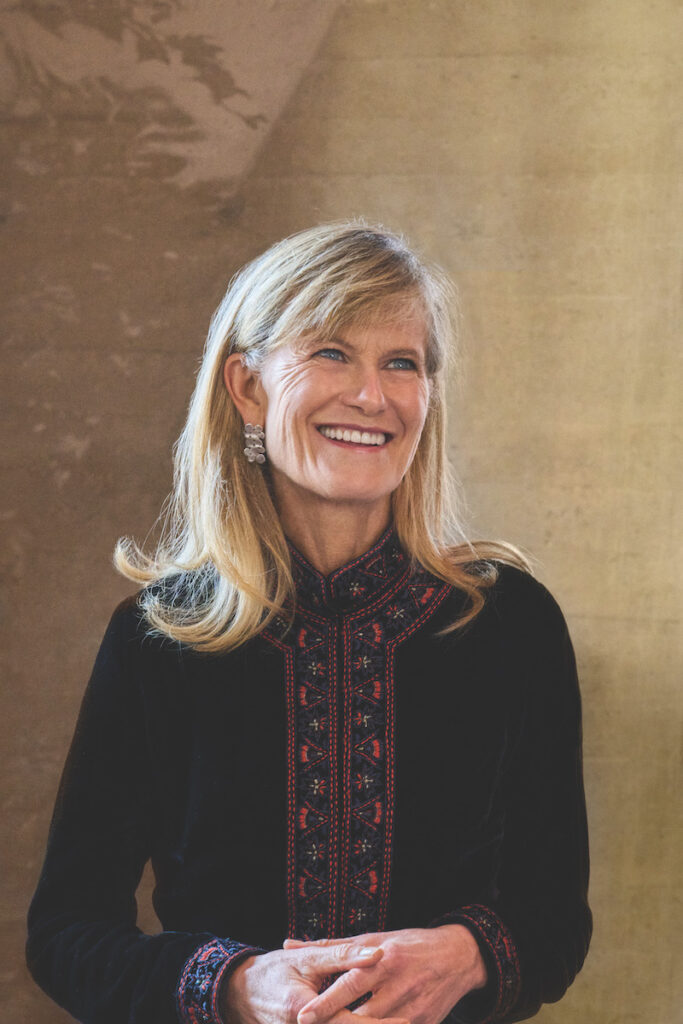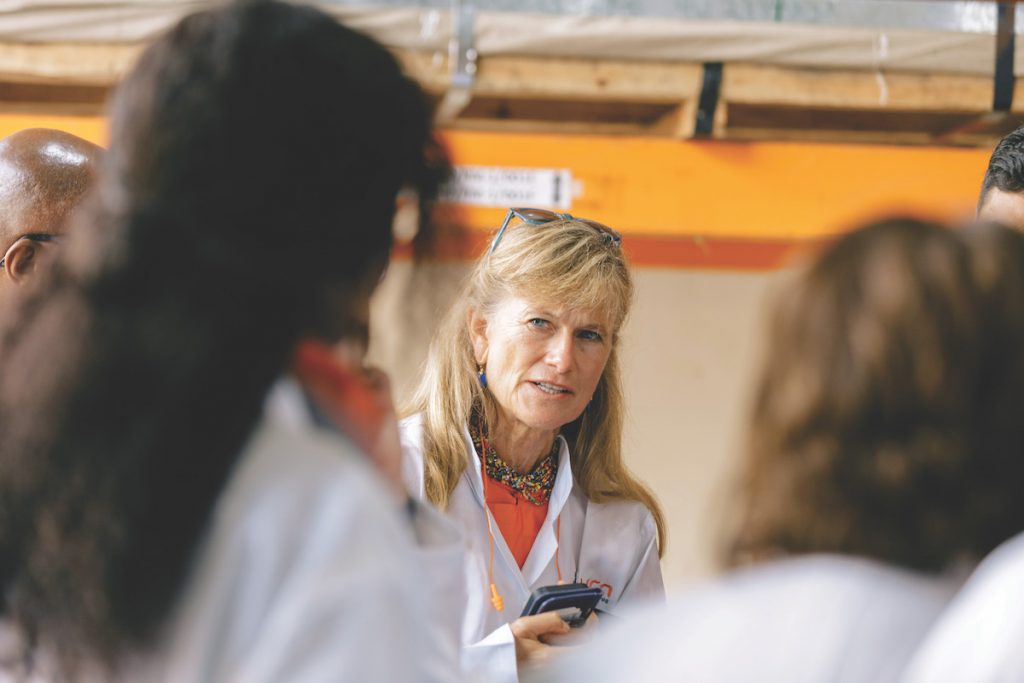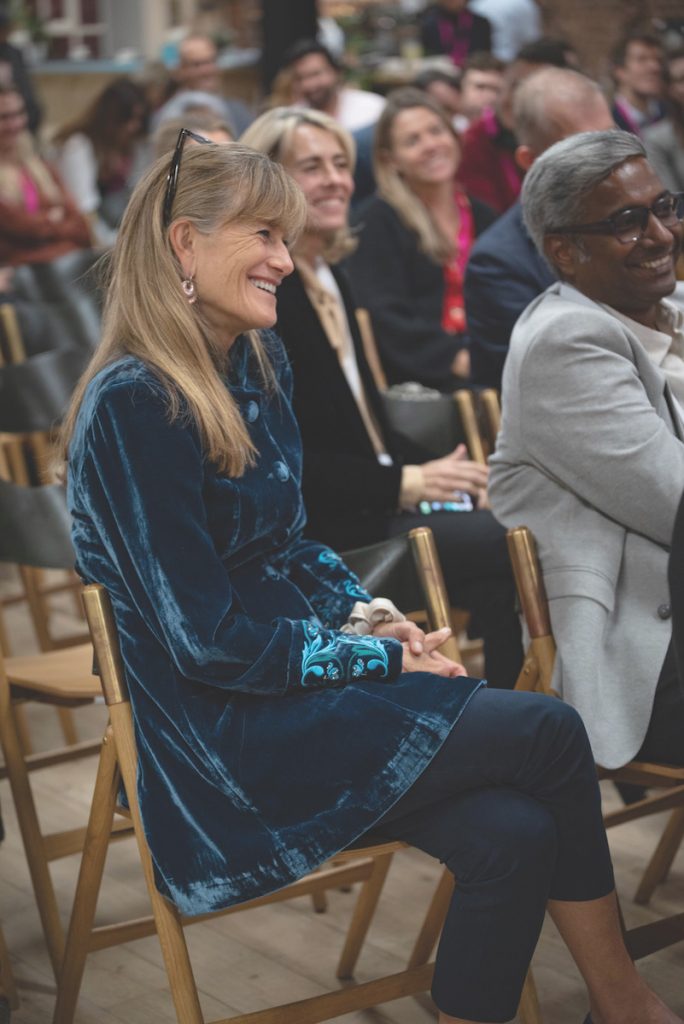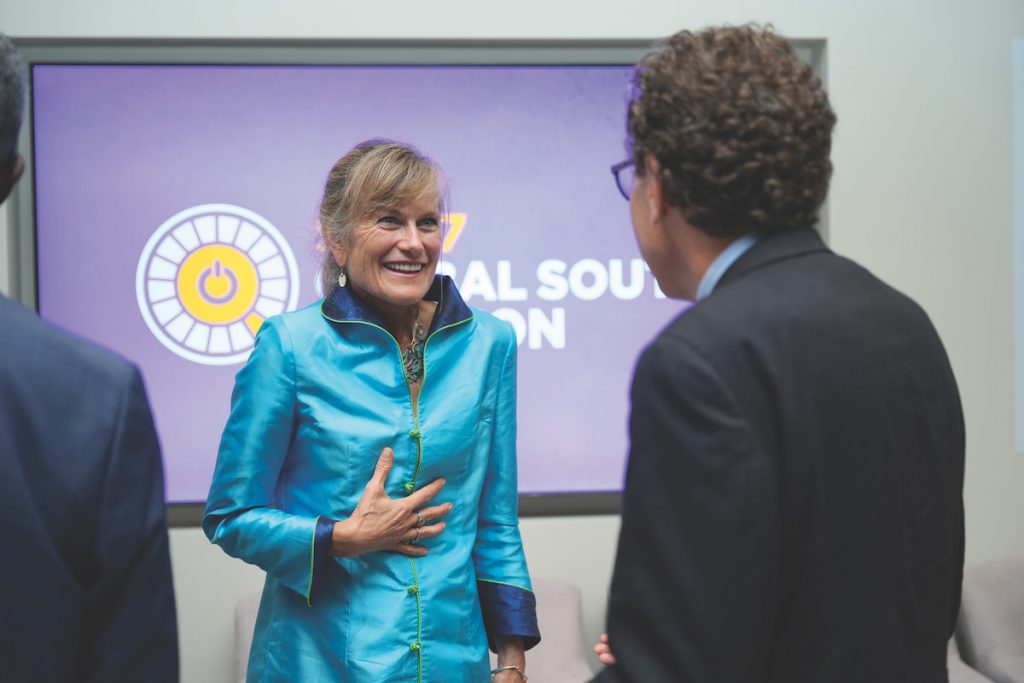Money as Healing with Acumen’s Jacqueline Novogratz
Read Time
19 min read
Posted on
September 5, 2024

Novogratz talks leading a moral revolution and helping pioneer impact investing, an industry that just might save the world.
By Kathryn Deen
If you could use a dose of hope, look to Jacqueline Novogratz. Hers is not some vague, pie-in-the-sky hope. It’s hard-edged and backed by action and results. This impact investing pioneer has been beating the drum for lifting people out of poverty for nearly 40 years, and her company, Acumen, has helped lead the way for 23 of those years.
Novogratz founded Acumen in 2001 during the early days of impact investing. Acumen invests in and supports nonprofit and for-profit companies and individuals fighting poverty and restoring dignity for long-term change. It has impacted over half a billion people and earned a spot on the 2024 Real Leaders of Impact Investing list.
She shares her well-earned lessons and most valuable insights on using money as healing in this candid conversation with Real Leaders.
Real Leaders: You helped establish impact investing as a new sector. What was it like to be at the forefront of this movement?
Jacqueline Novogratz: Nearly 50 years ago, pioneers like Muhammed Yunus, founder of the microfinance bank Grameen, and Ela Bhatt, founder of the Self-Employed Women’s Association, saw the power of using tools of business to make change. They made small amounts of credit available to very low-income women who otherwise would have had to pay usurious rates to many lenders.
I came in on this wave in 1986 when I moved to Rwanda and co-founded the nation’s first microfinance bank. That experience taught me not only that a small group of people could make a big amount of change, but that making markets work for the poor was essential to building nations. That thesis — using tools of business to solve problems of poverty and build a world of dignity — has been my life’s work.
The early days of establishing an entirely new sector can be tough. I founded Acumen in 2001 and can remember countless meetings with captains of industry who would explain with great certainty that my understanding of business was muddled. “I make money on one hand, and I give it away on the other” was their conventional wisdom. I found little curiosity among them regarding what had failed the poor and whether there might be new ways to solve problems that were more effective either than maximizing financial returns or giving charity away. Gandhi says, “First, they ignore you, then they laugh at you, then they fight you, then you win.” In 23 years our investments have impacted the lives of more than half a billion people. Patient capital and impact investment have grown into a multi-trillion-dollar market. Change is possible if you have the grit and resilience to keep working at an idea whose time has come.
RL: Tell us more about the new approach you took to solving poverty with Acumen’s patient capital model.
Novogratz: Our financial systems are constructed based on short-term thinking that no longer serves — if it ever really did. Patience is a revolution. For entrepreneurs to build business solutions serving very low-income people takes experimentation, sometimes failing and getting up to try again.
Early on we saw a growing group of entrepreneurs who had what we call moral imagination — the audacity to imagine the world that could be and the humility to interact with the world that is. They also had the resilience and grit to stick with solving a problem. We were willing to take bets on those entrepreneurs. Entrepreneurs see the possible in the impossible. They recognize opportunities in every problem. When it comes to low-income people, they see customers who want to change their own lives instead of passive recipients waiting for charity.
Acumen could bring long-term, risk-oriented patient capital as well as access to our social capital — networks, expertise, and knowledge.
When we started I thought patient capital meant seven to 10 years. I now see it as 10-20 years. That’s what it takes to build markets in places where people are very low-income, where there is very little infrastructure, where there’s often very little trust, where it’s hard to build talent pools that you can afford, and where there are often high levels of corruption.
RL: How has impact investing changed since you started?
Novogratz: When I started there was no impact investing space. So in the early years, we were one of the only games in town, and we were very defiantly focused on using philanthropy, investing it as long-term equity and debt. Accounting for the impact we made, any money that we get back gets reinvested.
There was an early set of philanthropists who had their own money and thought, “I can also do this,” but they didn’t want to give up returns. So they would set up capital pools with the same expectations — 20-23% returns — despite the fact that they were trying to solve world hunger. It took time for the industry to acknowledge that we need different pools of capital to solve different kinds of problems.
As the impact sector grew in size and sophistication, we grew in size and skill. Today we manage philanthropic-backed patient capital investments as well as a portfolio of larger for-profit impact funds. Those funds are structured for the problems they address. For instance, the Acumen Resilient Agriculture Fund is a $58-million blended fund with a first-loss component and significant technical assistance support. We’re working on a $250-million facility composed of philanthropy, debt, and equity to bring off-grid solar electricity to those considered hard to reach in 16 of the most fragile African nations. Our investment portfolios represent more than half a billion dollars in assets. Through all of it, we are committed to seeing investment as a means to solve tough problems of poverty — and not as an end in and of itself.
RL: Whom have you looked up to most in the impact investing space?
Novogratz: Ceniarth has always been willing to take outsized risk, move first, and go where others will not dare. Omidyar played a very strong role in this field. Currently the Green Climate Fund — the world’s largest climate fund funded by major governments around the world — is a brave partner with a commitment to fighting climate change. They are a real leader in structuring blended facilities so that we can reach the hardest-to-reach individuals with electricity or agriculture. IKEA Foundation also has been very innovative in supporting us to build new models in energy access, helping build green pathways out of poverty using new and inclusive business models. Without such partnerships, we would not have been successful.
RL: Is impact investing here to stay?

Novogratz: I once told a prospective philanthropist in Acumen about one of our companies, d.light, which is an off-grid solar energy company that has now reached over 160 million people with solar light and electricity. The philanthropist said, “I love the work that you do, but are you a real investor — because you still raise philanthropy and not just returnable capital?”
It really shook me. I said, “Help me understand what your definition of a real investor is.” He said, “I want at least market rates.” I said, “Help me understand what a market rate is when there hasn’t been a market and you’re the first one to create one.” And he said, “I would at least want 15-20% returns.” I said, “Here is the rub. The world continues to look at ‘real’ simply as the financial returns made to the investor. We are in a world where we have to deal with climate change and inequality, and we both believe that the private sector is a critical player in solving those problems. Yet when will we get to a point when real investors are rewarded for the good they do — the impact they create, the forests they conserve, the people they employ? To me, that’s what real investing is.”
I look forward to a day when we no longer need words like impact investing, social enterprise, and patient capital — where those modifiers are just assumptions and we don’t continue to put on pedestals players who might destroy value to the natural worlds and diminish human beings in service of shareholders alone.
RL: What metrics must the impact investing industry align on?

Novogratz: We need to have a conversation in the business and investing communities about the importance of subsidy. Look at Europe and the U.S. Both regions subsidize their agricultural and energy sectors. No nation has electrified without significant subsidy. Yet when it comes to the poor, investors often recoil at any hint of subsidy. We’ve never been more unequal. I was just in Kenya, where the nation is experiencing devastating floods due to climate change. Making rural electrification work for the poorest people will require businesses that are supported by wise policy and effective financing. That requires new ways of thinking and acting.
When it comes to building a company that serves the poor, affordability is everything. It’s right at the heart of how low-income people make decisions. Think about solving a problem like deforestation. Peter Scott was literally a tree hugger in the 1990s trying to save forests in Africa when he finally realized that the root cause of deforestation in Africa comes down to a few things, but the No. 1 reason is these little cookstoves that low-income women cook on. They cut down trees or use charcoal, which is made from trees. He realized that to save the trees, he had to build a cookstove that women can afford. That was hard to do because very poor women can’t afford a $40 unit, which is essentially the lowest cost that will reduce your fuel consumption by 50-60%. We were the first investor in his company, BURN Manufacturing. This year BURN will have sold 4 million cookstoves, saving 20 million trees, employing over 2,000 young people, and impacting over 20 million human beings whose health is changed, whose income is significantly increased, and whose footprint, which is already very small, is reduced even further.
We need more measures around the environmental impact that a company is creating, and we need to internalize those costs in the environment and for human beings.
Chocolate is a $100-billion industry built off 5 million cocoa families, 90% of whom make less than $2 a day. We will not have high-quality chocolate unless we find ways to fully integrate a supply chain so that those smallholder farmers are seen, valued, and earning a wage that allows them not to live in poverty. It shouldn’t be that difficult, yet we still measure a company’s performance in ways that make farmers price takers — whatever the global price is, here’s the price I will pay you even if it keeps you in poverty — rather than price makers valued for what they contribute. None of us wants to keep somebody in poverty every time we buy a chocolate bar.
RL: What is Acumen’s process for making investing decisions?
Novogratz: If you sat in on one of our investment meetings in the very beginning, it would look like serious investors sitting around the table.
Our manifesto is where you can begin to see why we are different. The first question we ask is, “Does this investment reach low-income people?” It starts by standing with the poor. “Is it structured in a way to give the company the best chance of succeeding in the long-term? And what is the character of the entrepreneur in whom we are investing?” At some point our tagline became, “At Acumen, we invest in character.” Why character? Because when you are trying to make significant change in these markets, you often end up operating in very corrupt environments.
We need to find those entrepreneurs who not only have the vision but also the grit, resilience, persistence, and moral imagination — who see low-income people as full human beings and therefore have the skills of patience, deep listening, and knowing how to connect across identities — to build companies that might start very small like Ziqitza HealthCare with nine ambulances and grow to bring 50 million people to hospitals across India.
Dave Ellis and his partner, Joe Shields, had never held a live chicken when they decided to start EthioChicken, a poultry company in Ethiopia. We were their first investor. They understood that farmers don’t have the capacity to do all it takes to raise a few baby chicks to maturity, but once a chicken is grown, it will forage for itself and provide eggs — an important source of protein — even during droughts. So the entrepreneurs built a business that employed agents who would buy 1,000, day-old chicks and work night and day to raise them to maturity. They would then sell them to farmers in tiny batches, and the farmers would sell the eggs that their families didn’t eat to local markets.
We accompanied that company with our patient capital for probably eight years. They paid us back, and then one of our for-profit funds, the Acumen Resilient Agriculture Fund, invested another round of capital in the for-profit impact space. Under the holding company Hatch, EthioChicken is now operating in nine African countries. The company works with 16 million agents, some of whom make $10,000 or more per year. Last year the company sold 43 million chickens to more than 3.5 million smallholder farmers who, in turn, sold 3.5 billion eggs. In Ethiopia they’ve been credited for significantly reducing childhood malnutrition. It’s thrilling for me to see Ethiopians building capacity in new markets like Rwanda or Ghana. They are creating local jobs, and they are creating value, not extracting it.
RL: Let’s talk about some hard-earned lessons when things didn’t go right.
Novogratz: We have a failure report. It’s so important to us. We make it public. It is an accountability mechanism for us, for our companies, for other impact investors, and for our peers. If we want to call ourselves a learning organization, we better not just have stories of how good we are. You learn more from your failures. You grow more from the hard times as a leader, and that’s the reality of risk-taking and investment.
About 25% of our investments fail. What’s interesting is most of those companies are still functioning, but we exited our investment. I would say there are typically three reasons for our failures.
One is the character issue, where you might discover two sets of books being kept. We have very few of those examples, but when they occur, they break your heart.
The second is when we’ve been too early on the innovation curve. In Pakistan we were the first investor in micro-health insurance without fully understanding the customer — that people didn’t want to pay for something they couldn’t see that might happen in the future if they got sick — so we wrote off our investment. But what was exciting about that is we watched a whole industry then build off of that experience and become a real leader in micro-health insurance for low-income people.
Third, early on we sometimes were too excited by the technology without fully understanding the distribution systems and low-income people’s preferences. A hearing aid that was $30 and operated as well as a $3,000 model — fantastic, but if you don’t have a distribution system, and if a low-income farmer doesn’t see the connection between that hearing aid and working in the field, you’re not going to have a market.
We’re a lot smarter now. We still make mistakes, and in fact, we have an adage in Acumen that if you aren’t willing to fail, you will not succeed.
RL: What is your outlook for the future of impact investing and Acumen?

Novogratz: What I’m excited about for the future is to see more players in this space and to support young people who deserve opportunities to build their ideas into reality. I’m committed to bringing forth practices of moral leadership that are not about righteousness or a set of rules coming down from on high but are about what it actually takes to operate in a world based on the growing recognition that we are connected to all human beings and living things, that our action and inaction can impact people every day, and that we have it within us to solve these problems.
However, the new set of skills needed are not the ones I learned in business school. They are focused on what we sometimes think of as soft skills: deep listening, holding opposing truths in tension, seeing our identity as a way of connecting with each other rather than as a way of dividing one another, telling stories that are truthful in ways that matter in a world of fake news. I believe that these skills of moral leadership are the new hard skills.
So how do we lift these hidden heroes, these new business models for a generation that is looking for more than inspiration? How do we show up as leaders and point to those people who are trying not to tear down but to build up?
I worry sometimes that investing and business get a bad name, some of it deservedly so. How do we get under all these labels and instead use the tools of business, the tools of capital in service of our world? I see how much change is possible, and I also don’t want people to forget that in my lifetime, we’ve gone from a world with 40% of people living in extreme poverty to 8%. I’ve seen the 40 energy companies we’ve invested in reach more than 230 million people with affordable solar light and electricity. Change is possible. You just have to work for it.
RL: What is your definition of a real leader?
Novogratz: A real leader is here to serve. A real leader asks herself not, “What am I doing in service of myself?” but, “What am I doing in service of others?” A real leader listens. A real leader learns how to partner. A real leader walks with humility and never lets go of their audacious dreams to build a world they know is possible.
Leadership Practices to Build a Better World
Jacqueline Novogratz’s latest book, Manifesto for a Moral Revolution (2020), delves into these leadership practices:
- Just start.
- Redefine success.
- Cultivate moral imagination.
- Listen to voices unheard.
- You are the ocean in a drop.
- Practice courage.
- Hold opposing values in tension.
- Avoid the conformity trap.
- Use the power of markets; don’t be seduced by them.
- Partner with humility and audacity.
- Accompany each other.
- Tell stories that matter.
- Embrace the beautiful struggle.
Novogratz’s Top Practice
As told to Real Leaders, here is Novogratz’s top practice.
The most important principle is to just start. There’s a lot of fear and cynicism in the world. “Where will I get the capital?” “I don’t know anybody.” There are a million excuses not to start. To that, I say start where you are with what you have. If you see something that looks like a problem, ask yourself, “What opportunity is that problem hiding? How might it be solved?” Take a step toward that problem. Try to understand it — not from your perspective but from the perspective of the people being impacted by it.
You probably will make a mistake. Fine. Learn from it. Take another step. Before you know it, not only will you be on your way to finding solutions to that problem, but you will be on your way to finding the purpose that will reveal itself to you as the whole reason that you’re here. Just start and then don’t quit.
I was a woman who just started — probably recklessly. As a 25-year-old banker with three years of Wall Street experience, I had no business trying to build a bank for women, and I was stretched to find Rwanda on a map back in 1986. I didn’t know a soul, but women had just gotten access to open a bank account without their husband’s signature. What I did know was that humans are capable of extraordinary things. So all I saw was the upside.
What I lacked when I first started was the humility to know what I didn’t know and to come without solutions but with a whole bunch of questions with respect for local knowledge. I learned to listen and to learn from those I was there to serve. I learned to be more patient and to behave like a guest until the locals decided to treat me like an insider — and that made all the difference.
As I grew I saw that you could change a corner of the world and make history. Maybe I had to go through the humiliation, rejection, and people calling me crazy. In fact, I’ve learned that when people call you crazy, it usually means you’re onto something. But if you persist, you keep showing up, and you treat the people around you with the kind of respect that you believe we need in the world, all of a sudden there’s an entity that’s bigger than you, and everybody who works with you is smarter than you. That all starts to teach you.
I have the same spirit now that I did when I was 25 years old. I know change is possible. I know what the tools are, and I’ve seen solutions work. I know the problems ahead are a heck of a lot more complicated and bigger than the problems seemed way back then, but it gives me a chance to seem crazy sometimes and start that journey all over again, and I am not stopping till I’m no longer here.
Overview
Jacqueline Novogratz, founder of Acumen and pioneer in impact investing, emphasizes the power of patient capital to address poverty through business-driven solutions. Her approach prioritizes moral leadership, resilience, and long-term investment in entrepreneurs serving low-income communities, demonstrating that thoughtful, impact-focused finance can foster sustainable change. Targeted at investors, social entrepreneurs, and policymakers, her work highlights how combining financial return with social impact is essential for tackling global inequality and environmental challenges.
AI-Generated Overview.






